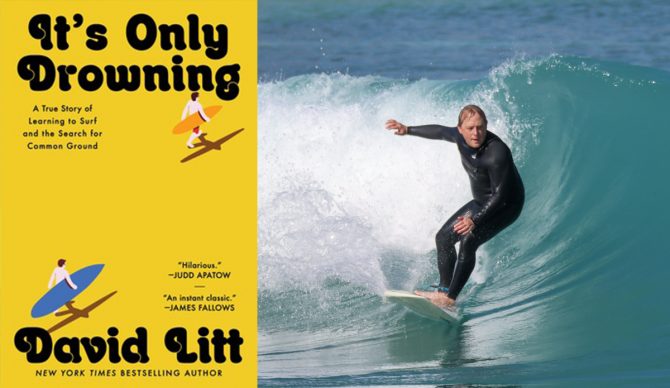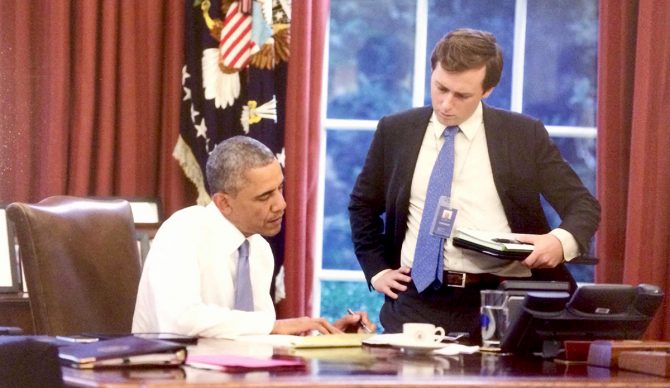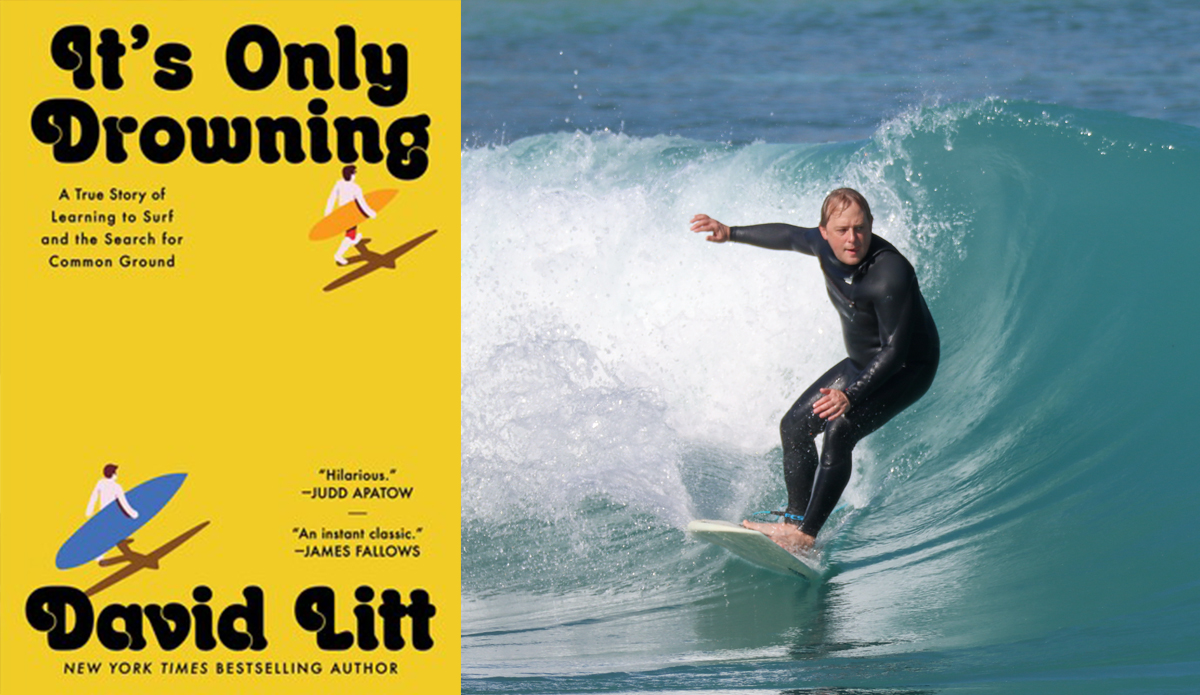
Photo: David Litt
![]()
Surfing has a funny way of taking over your life. In many ways it demands it, from learning the quirks of local breaks, to closely following swells as they cross the ocean, to waking up in the pre-dawn darkness to beat the crowd. Many a beginner, whether in youth or adulthood, has gotten just a brief taste of wave riding, only to find themselves immediately sucked into an existence that revolves around the sport.
David Litt was not someone who would have ever expected himself to get caught in that orbit, though. In his twenties, he’d made a name for himself as a speechwriter for Barack Obama (an experience that was the subject of his first book, Thanks, Obama). Afterwards, he ended up moving with his wife from Washington, D.C. to a house near the Jersey Shore. Just a few years later, though, the COVID pandemic hit and he found himself trapped in that house, battling depression and existential dread.

Prior to venturing out into the Jersey lineup, David Litt was a scribe for Obama. Photo: David Litt
Meanwhile, in the periphery of David’s existence was his brother-in-law, Matt, who somehow seemed to be thriving. Matt was a heavy metal-listening, motorcycle-riding Joe Rogan devotee, who worked as an electrician and had never registered to vote. He also surfed – a uniquely quixotic pastime in New Jersey’s famously fickle breaks. In short: the two men could not have been more different.
However, David’s decision to take up surfing on a whim would eventually turn them into an unlikely duo. Though he started off on his own, David quickly realized he needed a partner in his new pursuit and turned to Matt. Against all odds, they found themselves frequently venturing out into the waters of New Jersey together, and eventually much farther beyond that.
The roughly two-year journey became the basis for Litt’s newly-released memoir, It’s Only Drowning. In it, he tells the story of his progression from fearful tyro to eventually achieving a personal goal of surfing on the North Shore. However, the parallel narrative of a budding friendship with his brother-in-law forms the real heart of the book. By the end of it, it also eventually provides him with a powerful insight into how to reach across personal and political divides.
I spoke with Litt about his experience learning to surf, navigating writing about family, and using surfing as a way of communicating in a time when it can feel impossible.
What made you want to write this book?
I started surfing not at all thinking this would be a book. I was just trying to break out of a rut and try to get back in shape after the pandemic. Then I got hooked.
I’m just always looking for stories that, when I tell them to friends, they’re interested, they stay engaged, they’re laughing, they’re leaning in, whatever. And I started to be like, “Oh, these are some good stories.”
I had a publisher for the book before I really realized it was even more about me and my brother-in-law becoming friends than it was about me learning to surf, even though it’s obviously about both. I think that was the moment when I was like, “Oh, this really feels like I understand what this book is.”
You’ve called this the most personal book you’ve written. How is it different from your previous work?
Well, to begin with, I started surfing after the worst year of my life. It was a year when I got really depressed. I’d always been kind of high functioning, but also high anxiety – but this was really different. It was a year where it felt like I needed courage just to get out of bed, and some days I didn’t have it. It’s something that scares me, about how strangers are going to know about some of the toughest experiences that I’ve been through.
The other thing that was challenging, but in a good way, was writing about a friendship. My first book I wrote about me and President Obama a lot, but he was this larger-than-life figure. It’s not like I’m going to see him at Christmas. Whereas my brother-in-law, we’re stuck together, we’re going to see each other for the rest of our lives. So it was weird, writing about not just that kind of internal conflict that led me to surf, but also this interpersonal conflict that we had to sort of navigate and eventually get past on the way to becoming friends.
Has Matt read the book, yet?
Yeah. Originally he didn’t want to read it before it came out. So I was like, “Well, you know, what if you’re not happy with what I write about you?” And he said, “Nah, if I’m an asshole, just call me an asshole.” I was like, “Okay, I’m not going to do that.”
So he did decide he wanted to read it before it came out, but it was after it was too late for me to make any changes, so I was very nervous. He was working a job here in Asbury, so I drove over and just gave him a copy and I was watching him read a couple sentences.
Then it was actually really nice, because I think it was the first time it kind of became real to him that there was going to be a book about our journey together. It was also sort of the first time it became real to me. One of the great things about writing a book is that you can preserve those memories and go back to them, and it was cool to be able to do that with someone else who’s also in the book, particularly because he liked it.
You talk in the end about finding “neutral ground” with not only just Matt, but also Matt as a stand-in for conservative people. How much of this experience was also you learning to connect with people across the political aisle?
We spent two years where I was surfing with Matt and thinking about the book, and I thought, “Okay, at the end of it, we’ll discover that actually, we have a ton in common we never knew about.” And it turned out that really isn’t true.
Other than the fact that we like to surf, we started with almost nothing in common, and we still don’t really have a lot in common, but that’s okay. And that’s the “that’s okay” part that really changed the way that I think about not just politics, but relating to other people at a moment when everything feels political.
There’s real serious differences that I have with a lot of people who I know from any number of different places. I’m not going to discount that. I believe what I believe really strongly, in some cases, and I know they do too, but that doesn’t have to mean everything. We can find these spaces, this neutral ground, where we can spend time together and think about things that aren’t the things that divide us. And I think, right now, there’s so much stuff that divides us, and frankly, there’s a lot of people, on all sides of the political spectrum, who gain audience attention, clout and money by pointing out all of the divisions. So it was really meaningful to me to be like, “Okay, we can actually step back and not focus on that for a little bit.”
In terms of finding neutral ground, how much of that do you think was a function of specifically doing it while surfing, as opposed to just spending a lot of time with Matt?
I think that surfing is a very special type of space. The lineup is different than the mat at a rock climbing gym, or the sideline at a pickup soccer game (nothing against those things).
I think there’s a few reasons for that. One of them is that surfing is a screen-free activity. You can’t be online and in the lineup, and I think that actually really helps, in a moment when so many of the divisions that we have are exacerbated by the online discourse.
Another big part of it was the physicality and the challenge of it, and the sense of wildness and violence to it. Being pitched off a double overhead lip – the experience of surviving that with Matt brought us closer together. Even though it did not expose any common ground, that’s an experience where, if you make it through it with someone, you can’t help but feel closer to them than you were before. So I do think that was very different.
You had this goal of surfing on the North Shore that you wanted to make by the end of the book. Do you have another goal planned, or another trip with Matt in the future?
Well, we definitely want to go back to the North Shore, we just have to be in Hawaii-trip shape, which is a different beast. Maybe this hurricane season, we’ll be able to get back into shape and make another run at the North Shore, which would be fun.
There’s definitely places I’d like to go, but one of the things I really came to appreciate about Matt’s view was, anytime I would be like, “Where’s your favorite place to surf,” he’d be like, “New Jersey.”
It’s Only Drowning is available now!
